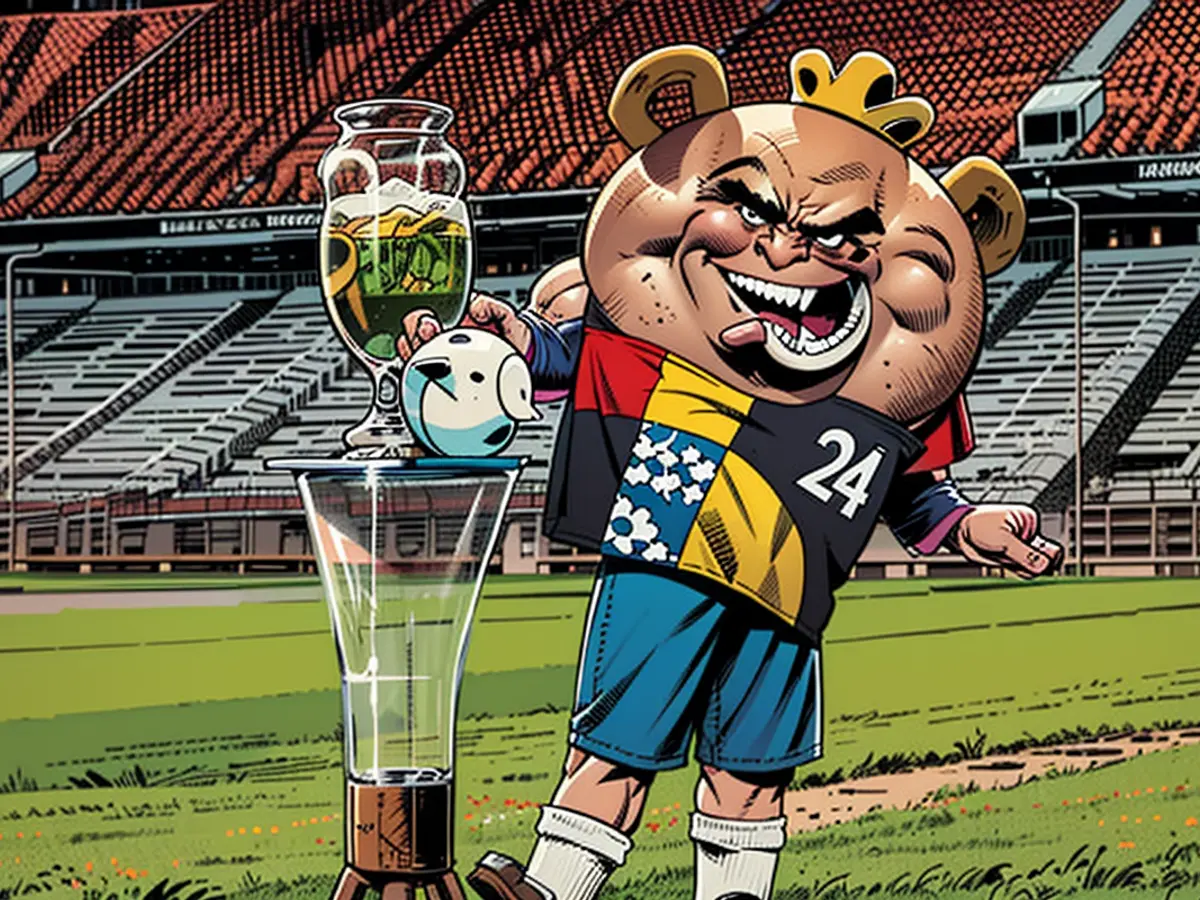Albert vs. Albert
Albert is the mascot for the UEFA European Championship. The organization claims Albert as a protected trademark to make money. However, there have been other creatures named Albert for some time now. According to UEFA, they can all "peacefully coexist." There is still conflict.
As the European Football Championship is about to start, the tournament's marketing machine revs up - as is customary for such sporting events. At the heart of the UEFA's multi-million-dollar business at the event are the trademarks it has protected and which can only be used by partner companies that have purchased expensive licenses. These include names such as "UEFA EURO 2024," "EURO 2024," and "Albert."
Albert is the name of the koala-like mascot for the championship. And the fact that the UEFA claims exclusive rights to the name Albert, as Michael Erhardt reports on ntv.de by phone, makes him "really angry." Erhardt had already filed an objection with the EUIPO against the registration of the Albert trademark by the UEFA months ago. He also filed a complaint against a UEFA partner and, according to his own statements, requested all Albet stuffed animals to be seized by German customs if they were imported.
Nearly a year ago, when a UEFA online poll resulted in a majority for Albert as the name of the Euro 2024 mascot, Erhardt had himself the wordmark "Albert" registered with EUIPO. The UEFA applied for this only in October 2023, according to the EUIPO database. According to the UEFA, this does not reduce their claim. The fact that Erhardt registered the mark a few hours after the announcement of the mascot's name online shows that he did so "maliciously," says Mathis Breuer, lawyer for the firm Hoyng Rokh Monegier, which represents the UEFA. Ehrhardt, says Breuer, is trying to steal rights from other people's trademarks. This is evident from his many legal disputes with other sports organizations, including the DFB. In court, his claims have always been dismissed.
"I'm a visionary," describes Erhardt himself. Following his own account, he has worked in many jobs, including as a waiter, "in the media," and in the film industry. Among the many things Erhardt claims to have created in all these years are a marketing concept with a slogan, which he once offered to the German Football Association. short time later, after the federation had rejected his ideas, so Erhardt, he was "shocked" to see the team bus of the national team - with his alleged slogan "For you - For Germany!"
Trademark Created in 2010?
There are no precise details about the creation of Albert. According to Erhardt himself, he created the figure in 2010. He says he had some ideas for a mascot for the 2010 World Cup and sent them to FIFA. These were not accepted. He then revised his ideas for the 2012 European Championship and sent them to UEFA. They accepted his ideas and made Albert the mascot for Euro 2024.
The UEFA confirms that it used Erhardt's ideas for the mascot, but it rejects his claim that he can secure rights to the "Albert" trademark. It argues that the mark has existed long before Erhardt and that it has protected itself.
Erhardt insists that he had protected the brand "Albaert" as early as 2010, and accuses the UEFA of lying about it. He also has evidence that he had registered the brand in 2010.
The question of whether the character Albaert was created in 2010 remains unresolved, as there are no conclusive proofs either to confirm or deny it. We only have Erhardt's word and the UEFA's denial.
The case ended up in court, and the court didn't find Erhardt's argument convincing, dismissing his claims against the DFB. But he still runs an online store called "We for Germany," which sells T-shirts with the slogan, and there's also a fan club for the national team named "We for Germany," started by Erhardt. The mascot of this fan club is a bear named Albert. Erhardt claims he came up with the character in 2010.
It's not surprising, Erhardt believes, that the DFB and now the UEFA appropriated one of his ideas. "Everything in the universe is connected," he says. However, he can't prove this connection, nor can he prove that his Albert actually existed and was used before the naming of the UEFA mascot. To have a trademark infringement, he would need to show that his Albert was used before the UEFA mascot was created.
He never thought of protecting the "Albaert" brand or demanding compensation for its use by others, he says. "There are at least a dozen Albaerts," including a stuffed animal from the insurance company Alte Leipziger, an Albert Teddy from a company in Albstadt, the mascot of the Swabian Alb Association, handmade Albaerts from an Austrian online shop, and many more. "The UEFA didn't even bother to check if this brand was already in use," Erhardt complains. He's not just fighting for himself and his Albert, but "also for all the other Albaerts." Breuer assures that this is unnecessary, as these Albaerts come from different areas and can "of course peacefully coexist" from the perspective of the UEFA.
Read also:
- Despite various Alберts existing as mascots and trademarks in the soccer world, Erhardt argues that his Albert, originating from his ideas for the 2010 World Cup, should not be overshadowed by EURO 2024's Albert, which was registered by UEFA despite its earlier existence.
- Brands such as "UEFA EURO 2024," "EURO 2024," and "Albert" play a significant role in UEFA's partnerships and licensing deals, bringing in substantial revenue for the organization during soccer events.








